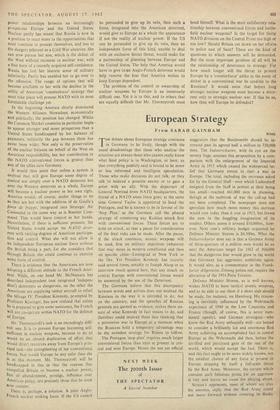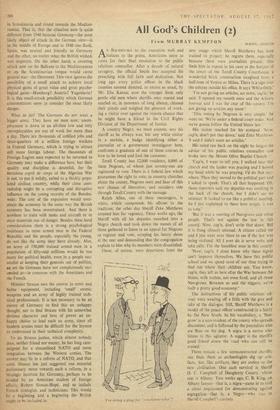European Strategy
From SARAH GAINHAM
THE debate about European strategy continues in Germany to be lively, though with the usual disadvantage that those who analyse the situation are always those who cannot really know what final policy is in Washington, or here; so that everything publicly said is bound to be more or less informed and intelligent speculation. Those who make decisions do not talk, or they talk to mislead a possible enemy or to gain a point with an ally. With the departure of General Norstad from NATO headquarters, the friend of a NATO atom force goes; at the same time General Taylor is appointed to head the Pentagon, and he is known to be in favour of the 'Step Plan,' as the Germans call the phased strategy of countering any Ruslian attack first with conventional forces. These forces are to hold an attack, so that a pause for consideration of the final risks can be made. After the pause, if the attack continues, atomic weapons will be used, first on military objectives (whatever that may mean in modern conditions) and then on specific cities—Leningrad or New York or the like. Yet President Kennedy has recently said several times, notably to Joseph Alsop in an interview much quoted here, that any attack on central Europe with conventional forces would be answered by the use of the Deterrent.
The Germans believe that this discrepancy between words and actions does not mislead the Russians in the way it is intended to do; but on the contrary, and the speeches of Russian generals are quoted as evidence, makes them un- sure of what Kennedy in fact means to do, and therefore could mislead them into thinking that a preventive war in Europe at a moment when the Russians hold a temporary advantage may be the soundest strategy for Russia to follow.
The Pentagon 'step plan' requires much larger conventional forces than exist at present in cen- tral and west Europe. Hence the not yet official
BONN
suggestion that the Bundeswehr should be in- creased past its agreed half a million to 750.000 men. The Industriekurier, with its eye on the money bags, assesses this proposition by a com- parison with the enlargement of the Imperial
Army in 1913 which caused the widespread be- lief that Germany meant to start a war in Europe. The total, including the increases asked for by the General Staff—over which Ludendorff resigned from the Staff in protest at their being too small—reached 661,000 men in planning, though at the outbreak of war the .call-up had not been completed. The newspaper does not speculate how much more money this increase would cost today than it cost in 1913, but leaves the sum to the boggling imagination of its readers. Others assess it around $10,000m., how- ever. Next year's military budget requested by Defence Minister Strauss is $4,500m. What the Industriekurier does say is that a German Army of three-quarters of a million men would be so near the American target for 1963 of 960,000 that the dangerous fear would grow in the world that Germany has aggressive ambitions again. It would also, as a commentator in the Frank- furter Allgemeine Zeitung points out, require the alteration of the 1954 Paris Treaties.
Defence Minister Strauss, as is well known, wishes NATO to have tactical atomic weapons, and to be able to use them if a short stab should be made, for instance, on Hamburg. His reason- ing is inevitably influenced by the Wehrmacht experience of 1940 in the Low Countries and France (though, of course, this is never men- tioned openly), and German strategists—who know the Red Army unhappily well—are bound to consider a brilliantly led and enormous Red Army achieving an accomplished fact in central Europe as the Wehrmacht did then, before the terrified and paralysed gaze of the rest of the world, which would accept the fact. There is, and this fact ought to be more widely known, not the smallest chance of any force at present in Europe stopping by itself a full-scale thrust by the Red Army. Moreover, the terrain which contains such fabulous prizes for an aggressor is tiny and leaves no room for playing about.
Strauss's opponents, most of whom are also his enemies, reply that the Red Army could not move forward without covering its flanks in Scandinavia and round towards the Mediter- ranean. That is, that the situation now is quite different from 1940 because Germany—the most likely object of attack in the German view—is in the middle of Europe and in 1940 one flank, Spain, was neutral and friendly to Germany and the other, no matter what the British wished, was impotent. On the other hand, a covering attack now on the Balkans to the Mediterranean or on the Scandinavian tongue would cause general war—the Deterrent. This view ignores the possibility of a small attack to achieve local physical gains of great value and great psycho- logical gains—Hamburg? Austria? Yugoslavia? It is this small-attack possibility which German commentators seem to consider the most likely danger.
What to do? The Germans do not want a bigger army. They have no men now; unem- ployment is down to an all-time low and only unemployables are out of work for more than a day. There are thousands of unfilled jobs and three-quarters of a million foreign workers in Federal Germany, which is trying to attract still more foreign labour. The thousands of Foreign Legion men expected to be returned to Germany may make a difference here, but their quality and discipline is doubtful, for the ferocious esprit de corps of the Algerian War is not, to put it mildly, suited to a thickly popu- lated civilian country, white their close com- radeship might be a corrupting and disruptive influence on the young recruits of the Bundes- wehr. The cost of the expansion would over- strain the economy in the same way the British economy has been overstrained. And there is nowhere to train with tanks and aircraft or to store materials out of danger. Besides these hard considerations there is a strong psychological resistance to more armed men in the Federal Republic and the people, especially the young, do not like the army they have already. Also, an army of 750,000 trained armed men in a population of fifty-odd millions would be too many for political health, even in a people suc- cessful at keeping their generals out of politics, an art the Germans have not conspicuously suc- ceeded at—in common with the Americans and the French.
Minister Strauss sees the answer in more and better equipment, including `small' atomic weapons and an army of highly trained tech- nical professionals. It is not necessary to be an enemy of Germany to find this an unhappy thought, nor to find Strauss with his somewhat devious character and love of power an un- happy choice to lead such an army, since all modern armies must be difficult for the laymen to understand in their technical complexity.
To do Strauss justice, which almost nobody does, neither friend nor enemy, he has long cam- paigned for a streamlined NATO and more integration between the Western armies. The answer may lie in a reform of NATO, and that soon. Strauss has just suggested one essential preliminary move towards such a reform, in a Strategic Institute for Germany, perhaps to be headed by an American student of foreign affairs, Robert Strauss-Hype, and to include French strategists and technicians. This would be a beginning and a beginning the British ought to he included in.































 Previous page
Previous page